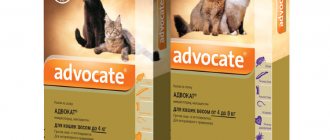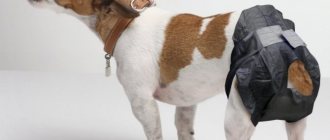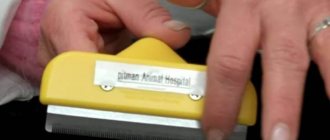Severe stress and the active nature of a dog can lead to nervous breakdowns and various mental problems. In especially susceptible pets, even minor external factors can trigger serious neuroses or changes in behavior that will have to be dealt with throughout their lives. To maintain the health of the animal and mitigate the stressful situation, you can use chemicals and natural herbal remedies. In this article we will look at what sedatives are available for dogs and how to choose them correctly.
Does your dog need sedation?
Regular or one-time stress can seriously harm a dog, especially if the pet has a flexible psyche and emotionality. To eliminate the influence of external irritants, a variety of drugs are used. They reduce the impact of an unpleasant factor and reduce the overall sensitivity of the body to stress. Dog sedatives may be helpful in the following situations:
- drive;
- temporary separation from the owner;
- visiting a veterinarian, hair salon;
- holidays accompanied by noise (loud music, explosions with fireworks);
- pregnancy period and birth of offspring;
- increased excitability of males, estrus of females;
- aggression;
- the experience of loneliness.
All medications are aimed at normalizing the functioning of the dog’s nervous system. More often they contain mild components that do not cause allergies or other adverse reactions.
To choose the most suitable remedy, you should contact your veterinarian. Even before the first dose, you should carefully read the instructions for use.
General remarks
Natural and herbal sedatives have few side effects, but unpredictable effects: some animals benefit from one drug, others from another. You may have to try several before finding one that works for a particular animal.
Cannot be used in conjunction with antidepressants and tranquilizers.
Despite the fact that visiting a veterinary clinic is certainly stressful for an animal, there is no need to use sedatives in this situation: the reaction to some diagnostic tests (including blood test results) may change, as well as the degree of manifestation of some diseases may decrease.
Even if the instructions for the drug indicate that it calms animals during periods of sexual arousal, there is no need to delude yourself - the instinct of procreation is not suppressed by herbs. The point of application of sedatives is not hormonal processes, but overexcitation of the nervous system against their background. In other words, natural (though not always desirable) sexual behavior will continue, but nervousness may decrease.
Before use, read the instructions carefully (this generally applies to all medications).
Popular drugs (chemicals)
Pharmacological sedatives for dogs are highly effective and fast acting. They contain various chemical components that affect the functioning of the animal’s nervous system. The disadvantages include the risk of adverse reactions, so it is necessary to correctly select the drug group and dosage corresponding to the weight of the pet.
Benzodiazepines
Drugs in this group have a sedative (calming) and hypnotic effect, and partially relieve seizures. They are contraindicated in case of severe panic or fear of the pet. All medications in this category quickly relieve symptoms, but the effect lasts for a short time (up to 8 hours). There is a risk of addiction, so benzodiazepines are not recommended for regular use. Popular drugs:
- Diazepam (Valium).
- Klonopin (Clonazepam);
- Xanax (Alprazolam).
The release form can be different - tablets or sedative injections. Such medications and their dosage should only be prescribed by a veterinarian based on the clinical picture.
A doctor's prescription is required for purchase.
Not recommended for calming an animal on the road or preventing stress from loud sounds.
Non-benzodiazepine tranquilizers
They have a rather mild sedative effect on the dog’s psyche. Recommended for the treatment of various phobias (fears) and anxiety disorders. In Russia, the only drug of this group is used - Buspirone (Spitomin). The drug rarely causes side effects; there is no drowsiness after taking it. To achieve relief from symptoms, a long course of use (from 4 weeks) with a gradual increase in dosage is required. For example, for medium breeds the initial dose is 0.7 mg per 1 kg of weight, then it is increased to 1 mg.
Tricyclic antidepressants (TCAs)
This group of sedatives is usually used to reduce causeless aggression, panic or fear in dogs.
They affect the circulatory system; before prescribing, a comprehensive diagnosis of the animal is required.
The main TCA drugs:
- Clomicalm;
- Amitriptyline.
Both drugs are prescribed in a course of up to 35 days, but a pronounced result is observed only after 1-2 weeks of use - by this time a sufficient amount of the active component accumulates in the body. During the entire treatment, you should be prepared for adverse reactions such as refusal to eat, increased thirst.
Tricyclic antidepressants are used with caution in small breed dogs.
Selective serotonin reuptake inhibitors (SSRIs)
This name refers to a large group of sedatives, which are tranquilizers and antidepressants. They are used to treat severe aggression, complex phobias, panic disorders and obsessive behavior of the animal. They have a strong and long-lasting effect, but require long-term use. They may cause adverse reactions in the form of gastrointestinal dysfunction, drowsiness and apathy.
The most popular drug in this category is Fluoxetine (Prozac, Solax or Fontex). It is used for medium and large breed dogs with diagnosed mental disorders. The dosage for animals is minimal, only 0.7 mg per 1 kg of weight per day.
Pheromone-based products
Pheromones are understood as volatile chemical compounds released by the body of animals. To produce sedatives, synthetic substances similar to those produced by the bitch during lactation are used. These are always mild remedies suitable for long-term treatment, for example, Adaptil and Help dog. In addition, pheromones are used in calming collars for dogs and ultrasonic diffusers.
Preparations with amino acids
This category of sedatives for dogs uses amino acids that are involved in certain reactions of the central nervous system. They do not cause addiction or adverse reactions, and have a mild effect on the body. Recommended for normalizing sensitivity to external factors, systematic use is possible. The most popular drugs in this group include glycine and tryptophan. The duration of the course and dosage should be selected by the veterinarian based on symptoms.
Natural herbal remedies
In veterinary medicine, a large number of sedatives for dogs based on natural ingredients are used. They have a mild effect on the body and are not addictive, but can provoke an allergic reaction - a tolerance test is required. Popular herbal remedies:
- "No stress" by Beaphar. Available in the form of soothing drops and diffuser. The active component of the composition is valerian extract.
- Fitex. These are drops based on motherwort, valerian, hops and skullcap. Recommended for stress relief in small dogs. The medicine normalizes blood pressure and relieves muscle spasms.
- Phospasim. Refers to homeopathy, the main component is passionflower extract. Recommended for normalizing behavior and enhancing the adaptive qualities of a pet.
- "Stop the stress." The product is presented in the form of tablets and drops. The composition contains phenibut, extracts of medicinal plants. Quickly relieves symptoms of severe fear or panic caused by sexual desire or stress.
- Nutri-Vet, "Anti-stress". Chewable tablets with tryptophan (an amino acid), taurine, hops and other plant substances. Suitable for normalizing the psyche and behavior of dogs of any size. Recommended for relieving anxiety and fear during hygiene procedures and visits to the veterinarian. It is used to normalize the central nervous system in bitches during estrus, as tablets against motion sickness in transport.
- Cat Baiyun. This is an herbal remedy that can be used to relieve stress not only in cats, but also in small breeds of dogs. The medicine relieves anxiety, spasms and has a sedative effect.
Despite the relative safety of natural sedatives, consultation with a veterinarian is required before using the medicine at home.
Only a specialist should prescribe the composition, regimen of use and dosage.
Over-the-counter tablets
Medicines aimed at combating alcoholism should be prescribed by a narcologist. However, there are also those that can be used in a variety of cases without serious danger. Among them:
- Glycine. It has an antidepressant effect. It is used to improve a person’s psychological state in combination with many other methods of therapy.
- Medichronal. These tablets have a detoxifying effect, stimulate metabolic processes, increase the activity of the cerebral cortex, which can improve the psycho-emotional background, relieve stress and improve sleep. In addition, Medichronal has a positive effect on liver function.
- Proprothene-100. Classified as a homeopathic medicine, it also has antidepressant properties. Allows you to achieve the required concentrations of biologically active substances in the human brain, helps reduce cravings for alcohol.
Herbs
To calm your pet, you can use not only ready-made medications, but also self-prepared herbal remedies. Plants with a calming effect for dogs:
- Valerian. Recommended for those with a tendency to overexcitation, panic and fear. Can relieve aggression and nervousness even in large dogs. The optimal dose is 15 drops of extract or infusion three times a day.
- Passionflower. Used as an analogue of valerian. Suitable for normalizing the state of the central nervous system and reducing aggressiveness in males. Used in infusions and drops.
- Motherwort. Sold in pharmacies in the form of a solution. Relieves tension, reduces fear and anxiety in animals. Rarely leads to adverse reactions.
- Skullcap. This herb helps relieve acute panic symptoms and initial forms of neurosis. It is used as part of a comprehensive recovery of the body after strong experiences. Disadvantage: the extract of this plant is contraindicated for heart problems.
Before giving a dog a natural sedative, it is necessary to assess the pet’s individual tolerance to the composition. To do this, put a few drops on your tongue or add to water, wait 1 hour to check the reaction.
Non-drug remedies
Not only the classic forms of sedatives (tablets, drops), but also alternative remedies for dogs are very popular. These include collars soaked in valerian or lavender ether, sanitary napkins with herbal extract. They help reduce the animal's stress during visits to the show, veterinarian or groomer.
In addition to pharmaceutical drugs, non-drug methods can also be used for dogs. Listening to calm classical music and intellectual stress demonstrate greater effectiveness. If your dog is very agitated, you can use a few simple commands (lay down, sit, or stand) to redirect attention away from the source of stress.
Briefly about the main thing
- Sedatives for dogs are required to normalize the central nervous system. Used to relieve anxiety, reduce the experience of stress or unpleasant emotions.
- Pharmacological drugs are highly effective. May cause side effects, there are contraindications. Effective drugs in this group: Diazepam, Clomicalm, Buspirone, Fluoxetine.
- To calm the pet, extracts of medicinal plants and herbal squeezes are used. Preparations based on them: No stress, Fospasim, Kot Bayun, Fitex.
- Useful herbs to calm your dog: valerian, motherwort, skullcap, passionflower.
Have you experienced stress in your dog? Share in the comments what medications helped you cope with this problem.
Precautionary measures
All sleeping pills are strong and can cause side effects. They should not be used without a doctor's prescription. The medicine is given to the pet strictly as directed and the degree of exposure is monitored.
Expert opinion
Makarenko Svetlana Igorevna
Practicing veterinarian, 15 years of experience.
Aggressively agitated dogs should not be given sedatives orally - there is a risk of being bitten. In this case, it is wiser to use a quick-acting injection.










